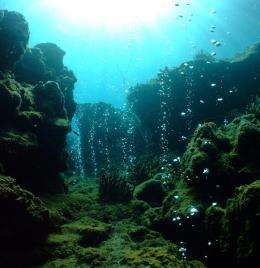Ocean acidification and coral reefs

(PhysOrg.com) -- Natural carbon dioxide (CO2) seeps in Papua New Guinea have given scientists rare insights into what tropical coral reefs could look like if human-induced atmospheric CO2 concentrations continue to rise unabated. At present rates of increase, the Intergovernmental Panel on Climate Change (IPCC) forecasts atmospheric CO2 levels of about 750ppm or more by 2100.
About a third of this extra atmospheric CO2 is absorbed by the world’s oceans. As a consequence, pH levels will drop from 8.1 to 7.8, resulting in increased ocean acidification which will severely impact marine ecosystems. The coral reefs, having the highest biodiversity of all marine ecosystems, are probably the most vulnerable.
Katharina Fabricius, scientist at the Australian Institute of Marine Science (AIMS) has led two research expeditions, with researchers from six countries including Germany, USA and Papua New Guinea. Among the international team of scientists was a group from the Max Planck Institute for Marine Microbiology in Bremen, experts in the field of microsensors, a valuable tool for studying coral reefs.
The team of scientists studied three natural CO2 seeps in Milne Bay Province, Papua New Guinea. This unique location was discovered by chance during a field trip to document biodiversity and is the only presently known cool CO2 seep site in tropical waters containing coral reef ecosystems. The study has given scientists unprecedented insights into what coral reefs would look like if greenhouse gas emissions and resulting ocean acidification continues to increase at present rates. At the seeps, streams of CO2 bubbles emanate from the ocean floor due to volcanic activity.
This week a scientific paper on the first results of this study is published in the prestigious, international scientific journal Nature Climate Change. It is the first scientific paper to present data on tropical coral reef ecosystems that are naturally adapted and acclimatised to elevated CO2. "Our research showed us there will be some winners, but many more losers, when tropical coral reefs are exposed to ocean acidification," said principal investigator Fabricius. "In the past, we have relied on short-term laboratory experiments to tell us what happens to marine organisms exposed to ocean acidification," she said. "Those experiments indicated deleterious effects on the performance of many species."
While laboratory experiments are important, Fabricius said the natural CO2 seeps in Milne Bay provided a more complete picture about the ecological consequences for coral reef communities when exposed to higher levels of CO2 for many decades. This natural setting allowed scientists to compare coral reef communities along a gradient from normal present day to low pH.
"We found that as pH decreases the number and types of corals making up coral reefs are much reduced. Diversity of corals drops by 40 per cent, and the reef becomes dominated by one form of corals, massive boulder corals (Porites). The cover of the more delicate tabulate, foliose and branching corals was reduced three-fold near the CO2 seeps. Similarly, the abundance of soft corals and sponges were also significantly reduced. Most importantly we found that reef development ceased below pH level 7.7."
One of the MPI co-authors, Martin Glas said: "Not only did coral abundance change, also other calcifiers like foraminifera and calcifying algae were strongly reduced under elevated CO2 levels. This is disturbing news as they represent key-species for the formation of a healthy coral reef and contribute significantly to the reefs calcium carbonate production."
Amongst the few winners at higher levels of CO2 were seagrasses which showed increased cover with three to four times more shoots and roots than under normal conditions. Fabricius said the study showed that ocean acidification leads to profound changes in coral reefs ecosystems.
"The decline of the structurally complex corals means the reef will be much simpler and there will be less habitat for the hundreds of thousands of species we associate with today’s coral reefs. They would not be the richly diverse and beautiful habitats we currently see in places such as the Great Barrier Reef. There are also fewer juvenile corals in areas with high CO2 levels, therefore coral reefs in those environments face greater challenges recovering from disturbances such as tropical storms.
Ultimately, what we observed was that the diversity of reefs progressively declines with increasing CO2. At concentrations similar to those predicted for the end of this century at a ‘business as usual’ emissions scenario, the "coral reef" observed was depauperate and lacked the structural complexity of present healthy tropical coral reefs. These changes are simply due to ocean acidification, i.e., even without the projected +2°C warming of the oceans associated with rising greenhouse gases. The 0.5°C warming we have already observed in the tropics in the last 50 years has already caused mass coral bleaching events and declining coral calcification.
The rate of increase of atmospheric CO2 continues to accelerate due to human activities. The range of exposures at the Milne Bay seep sites are comparable to end-of-century CO2 projections. It would be catastrophic if pH levels dropped below 7.8. This study proves we must urgently transition to a low CO2emissions future or we face the risk of profound losses of coral ecosystems."
Fabricius went to say that it was important for the researchers to continue their study in the unique location in Papua New Guinea and that future expeditions are in preparation.
More information: Katharina E. Fabricius, et al. Losers and winners in coral reefs acclimatized to elevated carbon dioxide concentrations, Nature Climate Change, 29 May 2011, online publication, (doi:10.1038/nclimate1122)
Provided by Max-Planck-Gesellschaft

















